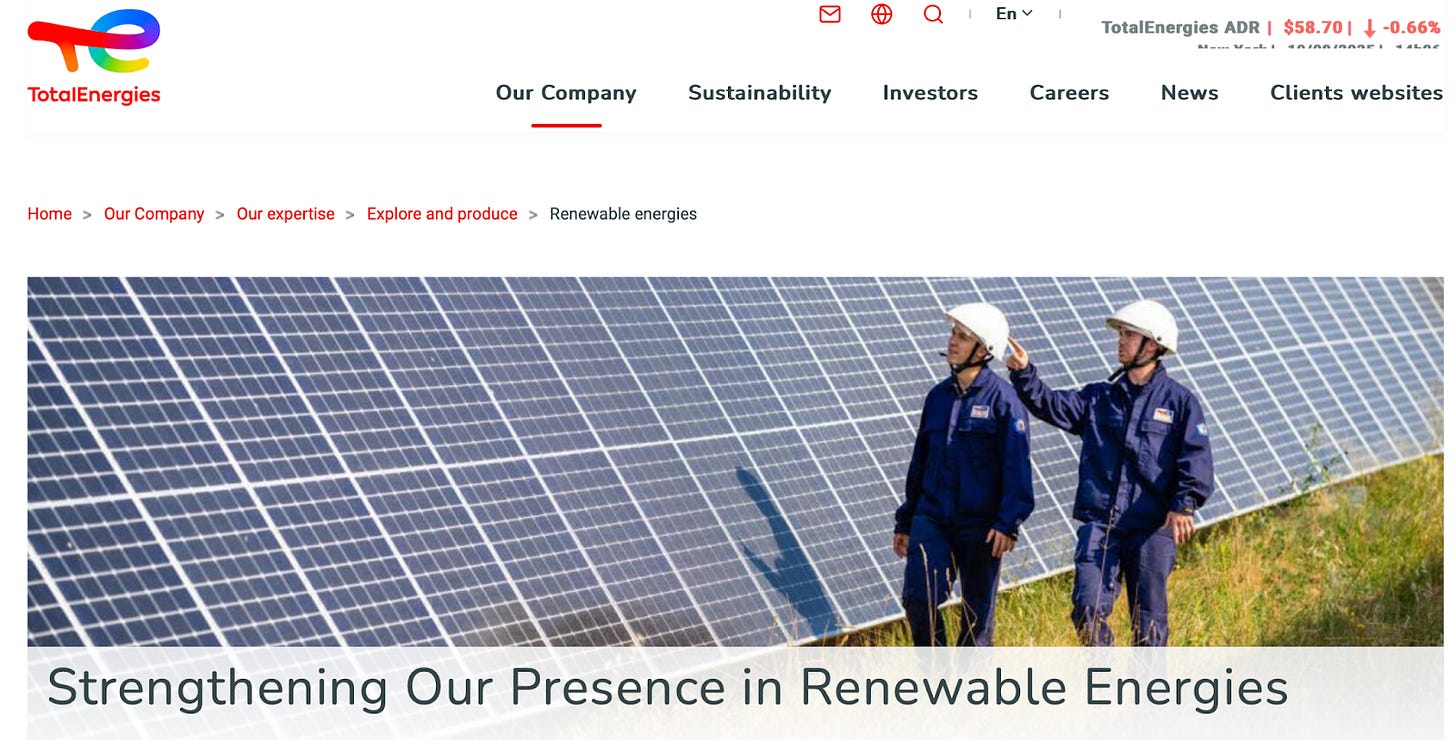Study: Oil companies are not ‘part of the solution’
New research in the journal Nature Sustainability reveals oil and gas companies own a “marginal” share of global renewable capacity, years after claiming they would lead the energy transition.
“I fundamentally believe we have a core role to play in the energy transition: the capabilities that we have, the scale that we bring, the insights, and everything else,” Ben Van Beurden, then the CEO of oil giant Shell, told Bloomberg in 2020. Shell should not be referred to as an oil company, he said.
Five years later, only .35% of the primary energy Shell produces comes from renewable sources — and the company contributes an even more miniscule fraction to renewable energy capacity across the globe, according to new research published yesterday in the journal Nature Sustainability.
The first-of-its-kind study shows that the world’s biggest oil and gas companies contribute less than 1.5% to global renewable energy — contradicting industry claims to be pioneers in the energy transition.
The study, conducted by researchers Marcel Llavero Pasquina and Antonio Bontempi at the Autonomous University of Barcelona, is the first to calculate the oil and gas industry’s share of renewable energy produced worldwide. The results — “that renewable energy remains a tiny part of the oil and gas industry portfolio” — are at odds with prior public commitments made by fossil fuel giants, the authors found.
Llavero Pasquina and Bontempi analyzed the world’s largest 250 oil companies’ ownership of wind, solar, hydro and geothermal projects according to data tracked by the NGO Global Energy Monitor. They found the oil industry’s renewable contributions to be “anecdotal” and their own diversification toward clean energy projects “negligible.”
“Our study questions the claim of the oil and gas industry to be ‘part of the solution’ to the climate crisis with empirical evidence,” the authors wrote.
None of the U.S. oil companies whose data was examined in the study — including Exxon, Chevron, ConocoPhillips, and Occidental — have operating renewable assets, Llavero Pasquina said. (Although Chevron says it will use renewable energy to power some fossil fuel facilities, its first fully-owned wind farm for that purpose has been idling for years). Companies including Shell, BP, and Eni — who once claimed to embrace wind and solar energy, in contrast to their American counterparts — generated less than 0.5% of their energy from renewable sources.
The new research shows that “fossil fuel companies have done almost nothing to build a renewable energy future,” said Kelly Trout, research director at the advocacy nonprofit Oil Change International. “Their record of delay and decades of deceit make it crystal clear: fossil fuel companies are the biggest cause of the climate crisis, and their political power is the biggest barrier to solving it.”
“An unwavering focus” on fossil fuels
For years, oil and gas companies protested criticism about their emissions — and deflected scrutiny over their role in the climate crisis — by emphasizing that they were essential for the world to transition to renewable sources.
“As we transition, our oil and gas business will continue providing the energy the world needs, while funding our investments in wind, solar and other renewable energy sources,” then-president of BP America, David Lawler, told members of Congress during a 2021 hearing into the spread of climate disinformation.
But BP and other fossil fuel companies have since shed their renewable commitments, citing costs and “an unwavering focus on growing long-term shareholder value.”
“Our optimism for a fast [energy] transition was misplaced,” said BP chief executive Murray Auchincloss earlier this year in announcement of the company’s “fundamental reset” to expanding oil and gas production.
While backing away from its commitments to renewable energy and doubling down on oil and gas, fossil fuel giants have spent big to escape regulation and oversight. Oil and gas companies and trade associations have continued lobbying to weaken and kill policies to reduce emissions. In the U.S., the industry spent $219 million helping to elect a government that now reportedly provides “concierge, white glove service” to fossil fuel companies seeking fast-tracked permitting while blocking renewable projects. Last year, Exxon sued its own shareholders in an attempt to block a proposal for the company to limit its greenhouse gas emissions.
Fossil fuel interests funded disinformation about renewable energy that is now being used as justification to obstruct wind and solar deployment. Major oil companies have switched to claiming they will decarbonize their oil and gas operations with contested ventures like carbon capture and “renewable natural gas,” which have so far proved to be vehicles for increased fossil fuel production. The transition to renewable energy — which just outpaced coal for electricity generation, a new report found — is happening without them.
Still, fossil fuel companies have been invited to participate in global climate negotiations, sponsor and collaborate on academic research, and weigh in on governments’ policy decisions “on the basis that the industry is a key player in an energy transition,” said Llavero Pasquina, the study’s lead author. “This narrative has been swallowed by institutions around the world.”
The researchers hope their new study will change that.
“After decades of empty words, it is time for governments, universities and public institutions to recognize that the fossil fuel industry will always be part of the problem, not the solution to the climate crisis,” Llavero Pasquina said, adding that oil companies’ “contribution to the fight against the climate crisis should be judged solely by how much fossil fuel they leave in the ground.”
In the courts
The new study could be used as evidence in lawsuits that accuse major oil and gas companies of climate deception — including through advertisements and marketing claims about their role in the energy transition.
“Exxon’s failure to inform ordinary consumers that its touted clean energy investments comprise only a miniscule percentage of its expenditures — and that it intends to increase fossil fuel production and sales in the future — renders these advertisements materially misleading,” reads the most recent complaint, filed by the state of Hawai’i in May.
The new research “adds to the overall picture of deception by the oil companies” and “could influence a jury if it gets admitted” as evidence at trial, said Pat Parenteau, an environmental law professor and senior fellow at Vermont Law School.
The study also has “important implications for potential liability” under climate disclosure laws, like those soon to be implemented by California and already in place in the EU, which require companies to report their greenhouse gas emissions and climate risks, Parenteau said.



https://substack.com/@sbm369/note/c-167240682?r=3wu1fz